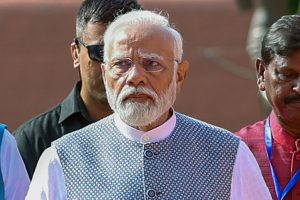It sounds startling, but true. India infamously accounts for 28 per cent of global suicides. There has been lack of basic healthcare facilities in 20-kilometer radius for mentally ill patients. Cutting across the nature of disability, the United Nations’ Committee on the Rights of Persons with Disabilities (CRPD) is not happy over people with disabilities (PWDs) in Assam detention centres in the registry process under the National Register of Citizens (NRC).
Its observation on the state of PWDs in the state of Assam is quite alarming. However, almost half of the population is not aware of mental health issues which are a cause of concern for the entire nation. Lack of awareness, fragile government policies and shoddy implementation, meagre private sector participation, excessive stigmatisation and dearth of social acceptance and inclusion could be attributed to the growing menace of mental illness.
This unravels the larger picture of mental health issues for which India is not prepared in an efficient manner. According to a study conducted in 2017, 13 per cent of the population worldwide suffers from mental illness in which children and youth are the worst affected. When it comes to India, the precarious condition remains the same. The National Institute of Mental Health and Neurosciences (NIMHANS), Bengaluru reports that 13.7 per cent of India’s population suffers from some form of mental illness.
However, the World Health Organization claims that the government’s total expenditure on mental health was only 1.3 per cent of total government health expenditure. Most importantly, the condition of 10.6 per cent of them warrants dire medical interventions. Only around 30 million Indians have access to minimum healthcare and around 120 million are left in the lurch. There are only 43 hospitals devoted to mental health and 3,000 psychiatrists in the entire nation.
The gap is quite apparent and is also widening. India passed Mental Healthcare Act in 2017 after immense amount of protests and deliberations across several quarters. Under this act, the focus has been on emphasizing bio-medical, clinical interventions and institutionalization to intervene into the matter. However, social determinants of health (SDH) which should be holistic part of curing mental illness, are been missing.
This largely raises the absence of ‘social model’ and ‘Rights model’ approach to mental illness which disability right activists are endorsing for the overall development of the disabled. It is found that the present generation is more prone to mental health issues and they are not aware of them. They are not getting professional counseling. Poor mental health has direct implications on poverty and social deprivation.
Moreover, social deprivations have larger repercussions on the lives of the disabled. According to the 2011 census of India, 78.62 per cent of persons with mental illness were unemployed. The inclusive job opportunities, affirmative actions, and other rehabilitative actions have been a fiasco. Barely half of them utilize the support offered under government programmes. Inclusive education is a distant dream.
There is dearth of a regulatory body or mechanism governing the functioning of counselors. However, certain educational bodies like the Central Board of Secondary Education (CBSE) have compulsory norms to keep counselors in schools. The growing activism in the sphere of human rights has led to spurt in the recruitment of mental health professionals in educational institutions. Apart from dealing with mental illness in education and health sector, the issue should be holistically addressed.
Tellingly, a mental health curriculum needs to be part of the existing educational paradigm within school and universities. In addition, research on the subject needs to be intensified. This will substantially reduce the rate of students grappling with suicidal thoughts, separation of parents, discrimination over sexuality and sexual preferences. The menace of mental health issues cannot be denied. Social and human rights model need to be fostered in order to make the disabled community inclusive.
Adequate amount of facilities in the field of health, education, employment and social climate are required so that they can lead their lives with dignity. The larger goal is to realize the National Mental Healthcare Act 2017 which promises to “strengthen health infrastructure along with addressing the social determinants of health and mental health.”
(The writer is an Assistant Professor at Symbiosis Institute of Media and Communication, Symbiosis International (Deemed University), Pune)











